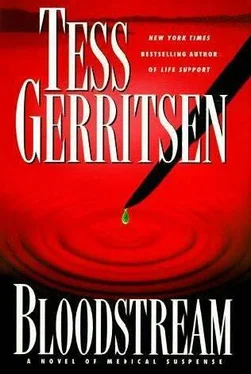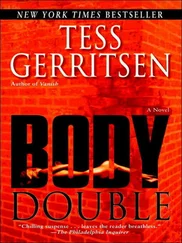He nodded. “Most likely. See how smooth the edges are? Of course you’ll need tissue diagnosis to confirm it’s benign. It’s about two centimeters in diameter, and it seems to be thickly encapsulated. Walled off by fibrous tissue. I suspect it can be removed without any residual tumor left behind.”
“Could this be the cause of his seizures?”
“How long has he had them?”
“Since his late teens. Which would make it close to fifty years.”
Chapman glanced at her in surprise. “And this mass was never picked up?”
“No. Since he’s had the seizures most of his life, I think Pomeroy assumed it wasn’t worth pursuing.”
Chapman shook his head. “That makes me rethink my diagnosis. First of all, you rarely see meningiomas in young adults. Also, a meningioma would continue to grow. So either this isn’t the cause of his seizures, or this is not a meningioma.”
“What else could it be?”
“A glioma. A metastasis from some other primary.” He shrugged. “It could even be an old walled-off cyst.”
“This mass looks solid.”
“If this was from TB, for instance, or a parasite, the body would launch an inflammatory reaction. Surround it or bind it up with scar tissue. Have you checked his TB status?”
“He was PPD-negative ten years ago.”
“Well, in the end, it’s still a pathologic diagnosis. This patient needs a craniotomy and excision.”
“I guess this means we have to transfer him to Bangor.”
“We don’t do craniotomies in this hospital. Our docs usually refer neurosurgery cases to Clarence Rothstein, out at Eastern Maine Medical Center.”
“You’d recommend him?”
Chapman nodded and flicked off the light box. “He’s got very good hands.”
Steamed broccoli and rice and a pathetic little dab of cod. Louise Knowlton didn’t know if she could bear it any longer, watching her son slowly starve. He had lost two more pounds, and the strain showed in his grim expression, his flashes of irritability He was no longer her cheerful Barry.
Louise looked across the table at her husband and read the same thought in Mel’s eyes: It’s the diet. He’s behaving this way because of the diet.
Louise pointed to the platter of French fries that she and Mel had been sharing.
“Barry sweetie, you took so hungry! A few of those won’t matter”
Barry ignored her, and kept scraping his plate with the fork, eliciting teeth-shattering squeals against the china.
“Barry, stop that!”
He looked up. Not just a glance, but the coldest, flattest stare she had ever seen.
With trembling hands, Louise extended the platter of French fries. “Oh please, Barry,” she murmured. “Eat one. Eat them all. It will make you feel so much better if you just eat something.”
She gave a startled gasp as Barry shoved his chair back and abruptly stood up.
Without a word he walked away and slammed his bedroom door shut. A moment later they heard the incessant gunfire of the video game as their son blasted away hordes of virtual enemies.
“Did something happen in school today?” asked Mel. “Those kids picking on him again?”
Louise sighed. “I don’t know. I don’t know anything anymore.”
They sat listening to the accelerating blast of gunfire. To the cries and moans of virtual victims as they lay dying in some Super Nintendo hell.
Louise looked down at the pile of limp and soggy French fries and she shuddered.
For the first time in her life, she pushed her dinner away, unfinished.
Noah’s stereo was playing full blast when Claire arrived home. The headache that had been building all afternoon seemed to tighten around her cranium, digging its claws into her forehead. She hung up her coat and stood at the bottom of the steps, listening to the relentless pounding of drums, the chanting of lyrics.
She couldn’t understand a single word. How am I supposed to monitor my child’s music when I don’t even know what the songs are saying?
This could not go on. She couldn’t deal with the noise, not tonight. She called up the stairs: “Noah, turn it down!”
The music played on, unabating. Unbearable.
She climbed the steps, her irritation swelling to anger. Reaching his room, she found the door locked. She pounded on it and yelled: “Noah!”
It took a moment before the door swung open. The music rushed at her, engulfing her in a tidal wave of noise. Noah hulked in the doorway, his shirt and trousers so baggy they hung like tattered ceremonial robes.
“Turn it down!” she yelled.
He flipped the amplifier switch and the music abruptly went dead. Her ears were still ringing in the silence.
“What are you trying to do, make yourself deaf? And drive me totally nuts in the process?”
“You weren’t home.”
“I was home. I’ve been yelling, but you couldn’t hear me.”
“I’m hearing you now, okay?”
“In ten years you’re not going to hear a thing if you keep playing your music that loud. You’re not the only one who lives under this roof.”
“How can I forget when you keep reminding me?” He dropped like a stone into a chair and swiveled around to face his desk. Turning his back on her.
She stood watching him. Even though he was flipping the pages of a magazine, she knew by the muscles tensed in his shoulders that he wasn’t really reading. He was too aware of her, of her anger toward him.
She came into his room and wearily sat down on the bed. After a moment she said, “I’m sorry I yelled at you.”
“You do it all the time now.”
“Do I?”
“Yeah.” He flipped a page.
“I don’t mean to, Noah. I have so many things going wrong at once, I can’t seem to deal with them all.”
“Everything’s all screwed up since we moved here, Mom. Everything.” He slapped the magazine shut and dropped his head in his hands. His voice was barely a whisper. “I wish Dad was here.”
For a moment they were both silent. She heard his tears fall on the page of the magazine, heard his sharp intake of breath as he struggled for control.
She stood up and placed her hands on his shoulders. They were tense, all his muscles knotted with the effort not to cry. We are so much alike, she realized, both of us constantly fighting to rein in our emotions, to stay in control.
Peter had been the exuberant member of the family, the one who screamed with delight on roller coasters and roared with laughter in movie theaters. The one who sang in the shower and set off smoke alarms with his cooking. The one who had never hesitated to say “I love you.”
How sad you would be to see us now, Peter. Afraid to reach out to each other.
Still mourning, still crippled amp;y your death.
“I miss him too,” she whispered. She let her arms slip around her son and she rested her cheek in his hair, inhaling the boy-smell she loved so much. “1 miss him too.”
Downstairs, the doorbell rang.
Not now. Not now.
She held on, ignoring the sound, shutting out everything but the warmth of her son in her arms.
“Mom,” said Noah, shrugging her off. “Mom, someone’s at the door.” Reluctantly she released her hold on him and straightened. The moment, the opportunity, had passed, and she was staring once again at his rigid shoulders.
She went downstairs, angry at this new intrusion, at yet another demand tugging her away from her son. She opened the front door to find Lincoln standing in the bitterly cold wind, his gloved hand poised to ring the bell again. He had never stopped in at her house before, and she was both surprised and puzzled by his visit.
“I have to talk to you,” he said. “Can I come in?”
She had not yet lit a fire in the front parlor, and the room was cold and depressingly dark. Quickly she turned on all the lamps, but light was poor compensation for the chill.
Читать дальше
Конец ознакомительного отрывка
Купить книгу












